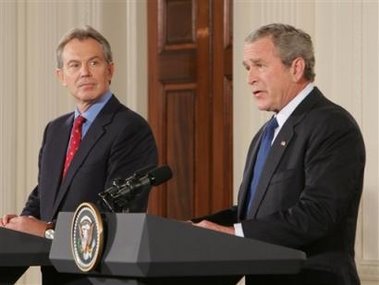Flip-flopping or honesty/humility


It is so good to hear George W. Bush and Tony Blair owning up to some of the shortcomings of policy and execution in the Iraq war.
The other day one of my students wore a T-shirt with the Heinz trademark on the front and something about John Kerry flip-flopping. We struck up a bit of a conversation in the last minute of class about the need for politicians to be able to change their position when the information available changes (such as WMDs not being found, etc.).
It takes a lot of courage and humility to be able to own up to mistakes in life. Whether it is in politics or any other profession, or in personal matters self-justification and pride are much easier options than honest acknowledgement of shortcomings and bad judgments.
I for one, am thankful that the president has come to this point. I would never think of accusing Bush of flip-flopping. I believe we need to allow for the possibility that as time goes by and as we think critically about what is happening in the world as a result of decisions that were made…we may come to the conclusion that some decisions did not produce the results hoped for. Leadership and commitment to certain values does not mean that we are beyond making errors in judgment. To be human is to be fallible. It is a sign of moral strength and character, not weakness, to acknowledge this.
This is not about flip-flopping, but about choosing HONESTY over DENIAL…HUMILITY over PRIDE. It is too bad that we see so little of these qualities in the political arena, where self-preservation and political capital lead to pragmatism and spin. Congressman Murtha (his plan for withdrawing troops) has been one shining example of speaking Truth to power regarding Iraq no matter what the political fall-out. He is one who did not allow his hawkish ideology to subvert an honest reading of what has happened as a result of the American policy in Iraq.
If the United States is going to regain the respect of the nations, it will be for the ability to express words and actions that come from character and decency—including the ability to say that we have made mistakes. It is not enough to just continue to blindly insist that we are right—and to plow ahead with our agenda through violent means. The moderated tone of Bush and Blair are just a small step in the direction of recapturing this respect and standing in the world.


1 Comments:
At 6:32 PM , Anonymous said...
Anonymous said...
Bush Admits Mistakes, But Not The Big Ones
Helen Thomas, Hearst White House columnist
POSTED: 3:46 pm EDT June 7, 2006
President George W. Bush has finally admitted that he made a mistake in his Iraqi misadventure. But it's only what he said, not what he did.
Asked what "missteps and mistakes" he regretted about the U.S. invasion of Iraq, Bush replied that his biggest regret was his use of cowboy language such as "bring it on" at the start of the war in 2003 and in saying he wanted terrorist leader Osama bin Laden "dead or alive."
Bush told reporters that it was this "kind of tough talk, you know, that sent the wrong signal to people."
"I learned some lessons about expressing myself in a little more sophisticated manner," he added.
If only the fault was simply his empty rhetoric. The acknowledgement of any mistake was a headline story for Bush, even though it was a slim mea culpa by a very defensive president.
Bush made the admission in a recent news conference with visiting British Prime Minister Tony Blair. The visitor was more substantive in his response to the same question when he confessed that the coalition had erred by disbanding Saddam Hussein's governing party, leaving a vacuum in Iraqi government expertise and leadership. Blair also said he and Bush underestimated the strength of the insurgency.
"It's easy to go back over mistakes that we may have made," Blair said. "But the biggest reason why Iraq has been difficult is the determination of our opponents to defeat us. And I don't think we should be surprised at that."
How profound of Blair to realize that Iraqis might have a sense of national pride and are inspired to fight and die against an invader and occupier.
If the answers from the two men are good indications of their own self-awareness and ability to engage reality, one wonders what planet they are on. I doubt that either leader has the remorse or courage to admit he was wrong to attack an oil-rich third-world country under false pretenses.
It's amazing to reflect on the fact that we are in Iraq because of a mistake -- and three years later can't seem to get out. One reason we can't get out is that our leaders don't want the families of the 2,460 Americans killed in the war to feel that their loved ones died in vain. Unfortunately, this is a tragic self-perpetuating dynamic.
Bush and Blair do not want to look back on their real miscalculations. Instead, Bush wants us to believe that the U.S. is in Iraq for the long haul, until total victory is achieved against the insurgents and terrorists. Former White House press secretary Scott McClellan used to daily trumpet a boast that we were "going to win" in Iraq.
Bush also said the American military's biggest mistake was the treatment of the prisoners at Abu Ghraib, the notorious prison near Baghdad where inmates were subject to degrading treatment.
"We've been paying for that for a long period of time," Bush said.
Actually, mostly low-ranking soldiers have paid the price in prison time for those misdeeds, not their commanding officers or top Bush administration officials who signed off on tough treatment for the detainees.
Meantime, more scandals pile on as the occupation continues. Bush says he was "bothered" by the allegations that a group of Marines may have killed 24 Iraqi civilians, including a 3-year-old girl, last November in Haditha to avenge the death of a buddy.
The incident brought back memories of the My Lai massacre during the Vietnam War.
Rep. John Murtha, D-Pa., a one-time hawk on military matters who served in the Marine Corps, said the troops overreacted at Haditha "because of pressure on them, and they killed innocent civilians in cold blood."
Murtha stunned Congress several months ago when he called for a U.S. withdrawal from Iraq.
The troops are being given a refresher course on the rules of war. Maybe Bush and Blair should bone up on international laws against starting wars in the first place.
(Helen Thomas can be reached at the e-mail address hthomas@hearstdc.com).
Discuss Helen Thomas' Opinion
Copyright 2005 by Hearst Newspapers. All rights reserved. This material may not be published, broadcast, rewritten or redistributed.
Post a Comment
Subscribe to Post Comments [Atom]
<< Home